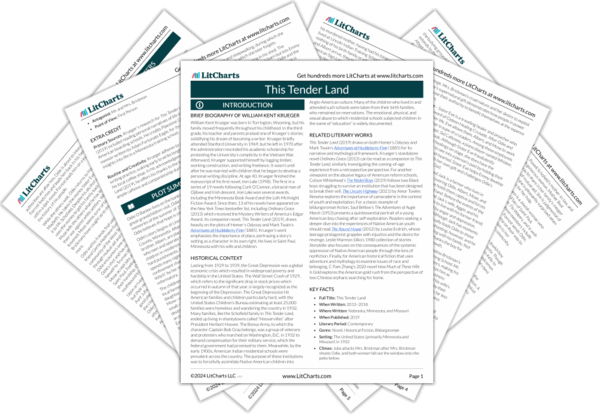Odie’s harmonica symbolizes the longing and hope for a better world that a person can find through creative mediums such as songs and stories. The harmonica is Odie’s sole inherited possession from his deceased father, Ezekiel, granting it significant sentimental value. Mrs. Brickman frequently threatens to permanently confiscate the harmonica, suggesting that she understands its importance to Odie and would love a reason to hurt him by taking it. Initially, Odie plays his harmonica for entertainment, but his playing often ends up evoking strong emotions. Notably, he plays “Shenandoah” at Mrs. Frost’s memorial, knowing that she loved the song because it was the late Mr. Frost’s favorite. Similarly, one-eyed Jack requests Odie play “Red River Valley,” even though it makes him melancholy. In these moments, the novel demonstrates how music can remind a person of times when their life was better, eliciting deep feelings of longing for the past. Despite the pain that comes with such longing, it is—in some cases—preferable to forgetting the good things that have been lost. By the time Odie plays his harmonica with Mr. Schofield in Hopersville, its music begins to hint at the possibility of a better future, not just the memory of a better past. In Odie’s story of the four Vagabonds, he imagines the harmonica’s music as capable of reviving hopeless people who have lost their souls. Although there are times when Odie refuses to play his harmonica, signifying his own struggle to maintain hope, the novel’s use of this symbol highlights the importance of envisioning a kinder future, even when such optimism seems like nothing more than a song.
Harmonica Quotes in This Tender Land
The Windigo, he said, was a terrible giant, a monster that had once been a man but some dark magic had turned him into a cannibal beast with a hunger for human flesh, a hunger that could never be satisfied.
[…]
At length, Mose tapped my shoulder and took my hand. You tell stories but they’re real. There are monsters and they eat the hearts of children.
As the piano player laid down the first few bars, I moved out into the dark of the meadow, sat down, pulled out my mouth organ, and played right along with them. Oh, it was sweet, like being fed after a long hunger, but it filled me in a different way than the free soup and bread earlier that night had. Into every note, I blew out that longing deep inside me. The song was about love, but for me it was about wanting something else. Maybe home. Maybe safety. Maybe certainty. It felt good, in the way I’d sometimes imagined what prayer might feel like if you really believed and poured your heart into it.
“This kid,” I began, “was just like us. He loved the sun on his face, the dew on the morning grass, the song of birds in the trees. He loved to skip stones on the river. At night he liked to lie on the sand and stare up at the stars and dream. Just like us. He had people who loved him. But one day he went away and never came back, and they were heartbroken. They vowed not to speak his name again until the day he returned. That day never came. But every night his mother stood on the riverbank and called his name, and if you listen close at night, you can still hear the wind over the river whisper that name so he will never be forgotten.”
We played some tunes together. My repertoire was broader than his, but we knew a few of the same melodies, and as we played, folks came away from their own little places and gathered around the fire. And a kind of miracle happened, or what I thought of then as a miracle. One man brought out a sack of ginger cookies and passed them around to children who were there. Someone else offered up a jug of cider. Apple slices appeared and some cheese and bread. And while Captain Gray and I played, and a few of the folks who knew the tunes sang along, the people in the gathering, none of whom had much, found a way to feed one another.
“But when I heard the music from your harmonica, it made me want to sing. When I looked out the window, I saw a change in my people. I saw life returning to their faces. I saw fire in their eyes again. I think if you keep playing and I keep singing, we might save them.”
And that’s what they did. He played his magic harmonica and she sang in her beautiful voice, which came from her deep love for her people, and slowly everyone in the castle, everyone who’d lost their souls, woke up, and new souls grew in them and they were whole and happy again.
We risked a fire that night and sat together, talking quietly around the flames, as we had on many nights since we’d taken to the rivers. It began to feel to me as if what had been broken was coming together again, but I knew it would never be exactly the same. With every turn of the river, we were changing, becoming different people, and for the first time I understood that the journey we were on wasn’t just about getting to Saint Louis.
In every good tale there is a seed of truth, and from that seed a lovely story grows. Some of what I’ve told you is true and some…well, let’s just call it the bloom on the rosebush. […] Our eyes perceive so dimly, and our brains are so easily confused. Far better, I believe, to be like children and open ourselves to every beautiful possibility, for there is nothing our hearts can imagine that is not so.












